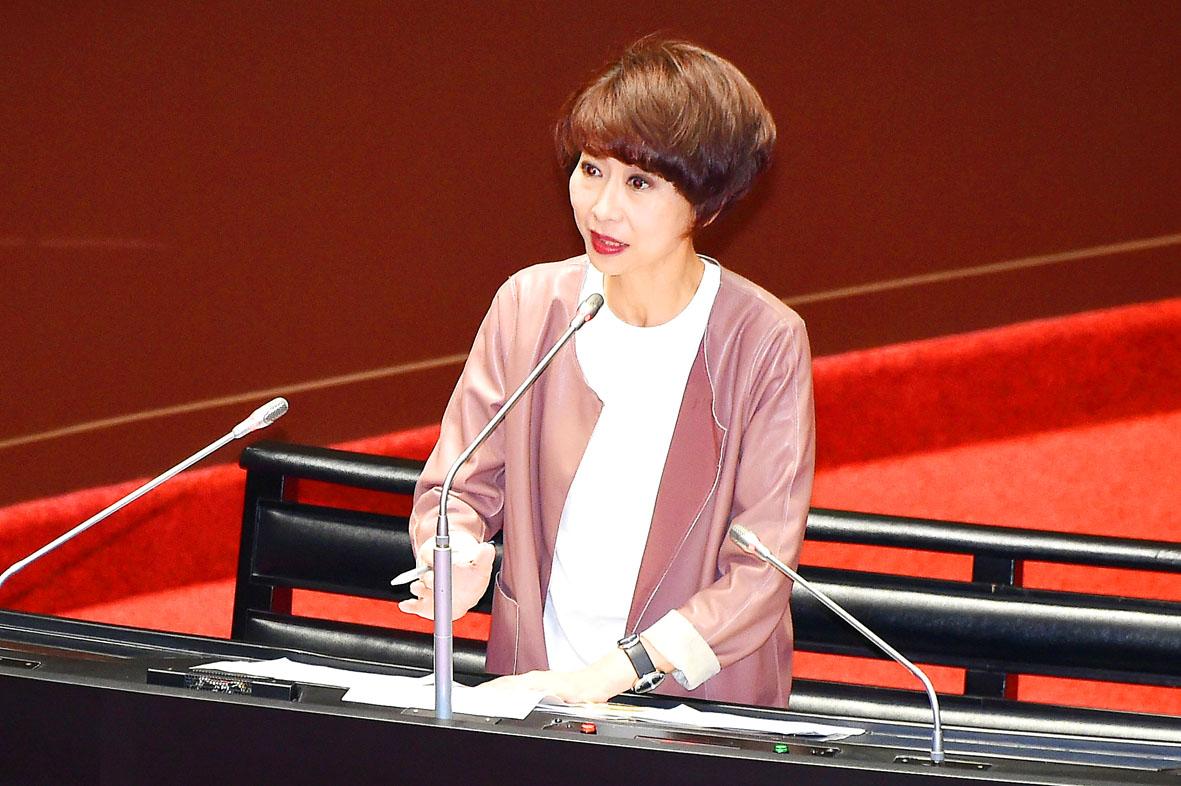Rules against children’s books that are Chinese propaganda need to be enforced properly, Democratic Progressive Party (DPP) Legislator Chen Ting-fei (陳亭妃) said on Thursday.
More than 5,100 Chinese publications were sold in Taiwan from 2018 to last year, but the publishers of only 237 of them, or 4.6 percent, had applied for permission to distribute them, Chen said, adding that the Ministry of Culture needs to enforce the law.
At a news conference in December last year, Chen said that a Chinese picture book, Waiting for Dad to Come Home (等爸爸回家), had been donated to libraries and sold at bookstores, despite its Taiwanese publisher not being given permission.

Photo: Tu Chien-jung, Taipei Times
The book hailed China’s COVID-19 response by featuring the story of a Chinese boy whose father, a doctor, was unable to return home for the Lunar New Year holiday because he was battling the pandemic, she said.
Among the propaganda elements in the book were stars forming the words “Go China” and “Go Wuhan” on cityscape illustrations of Beijing and Shanghai, she said.
“It is all about glorifying China’s COVID-19 response and is not of educational value for kids,” she said.
The Act Governing Relations Between the People of the Taiwan Area and the Mainland Area (台灣地區與大陸地區人民關係條例) says that publications from China must be authorized, with breaches punishable by a fine of NT$40,000 to NT$200,000.
“However, the ministry merely asked the publisher to take the book off shelves and did not impose a fine,” Chen said on Thursday.
“When we revealed the case last year, Minister of Culture Lee Yung-te (李永得) said that he would propose amendments to require permission only for books from publishers belonging to the Chinese Communist Party or the Chinese People’s Liberation Army,” she said.
“However, four months later, the ministry has done nothing about this matter,” she said.
Lee in February said that the regulations covering Chinese books were seldom enforced.
Only four complaints have been filed against Chinese publications in the past decade, Chen said.
After Chen revealed the alleged breaches in December last year, the ministry sent notices to remind publishers to comply with the law, sources said, adding that several publishers thought it was a new regulation, and not an existing one.
DPP Legislator Tang Hui-jen (湯蕙禎) said that China has a campaign to “brainwash” Taiwanese through such publications.
“Many unauthorized Chinese books on the market are tools in China’s united front strategy to influence our citizens,” Tang said. “I have proposed a bill to prohibit all publications promoting China’s communist ideology and those using united front tactics, as they must be banned.”
“The bill was taken off the agenda in a legislative committee meeting, but I will reintroduce it,” she said.
“Enforcement of these rules is not restricting freedom of publication and it is not about censoring books,” Tang said. “People must comply with the law governing cross-strait relations because of Taiwan’s and China’s unique political histories.”
Taiwan is a democratic country with freedom of expression and freedom to publish, and the government does not censor books, but “we have regulations covering the distribution of Chinese books, and publishers must not break the law,” she said.
The government should determine whether Waiting for Dad to Come Home is the tip of an iceberg and “whether other Chinese books that promote Beijing’s political ideology are secretly flooding into Taiwan,” Tang said.
Ministry officials said that checks are being carried out on Chinese books on the market.
The Mainland Affairs Council said it would work with the ministry to ensure that the law is enforced.
Additional reporting by Jason Pan

POSITIVE DEVELOPMENT: Japan and the US are expected to hold in-depth discussions on Taiwan-related issues during the meeting next month, Japanese sources said The holding of a Japan-US leaders’ meeting ahead of US President Donald Trump’s visit to China is positive news for Taiwan, former Japan-Taiwan Exchange Association representative Hiroyasu Izumi said yesterday. After the Liberal Democratic Party’s landslide victory in Japan’s House of Representatives election, Japanese Prime Minister Sanae Takaichi is scheduled to visit the US next month, where she is to meet with Trump ahead of the US president’s planned visit to China from March 31 to April 2 for a meeting with Chinese President Xi Jinping (習近平). Japan and the US are expected to hold in-depth discussions on Taiwan-related issues during the

‘LIKE-MINDED PARTNER’: Tako van Popta said it would be inappropriate to delay signing the deal with Taiwan because of China, adding he would promote the issue Canadian senators have stressed Taiwan’s importance for international trade and expressed enthusiasm for ensuring the Taiwan-Canada trade cooperation framework agreement is implemented this year. Representative to Canada Harry Tseng (曾厚仁) in an interview with the Central News Agency (CNA) said he was increasingly uneasy about Ottawa’s delays in signing the agreement, especially as Ottawa has warmed toward Beijing. There are “no negotiations left. Not only [is it] initialed, we have three versions of the text ready: English, French and Mandarin,” Tseng said. “That tells you how close we are to the final signature.” Tseng said that he hoped Canadian Prime Minister Mark Carney

President William Lai (賴清德) yesterday bestowed one of Taiwan’s highest honors on Saint Vincent and the Grenadines (SVG) Ambassador Andrea Clare Bowman in recognition of her contributions to bilateral ties. “By conferring the Order of Brilliant Star with Grand Cordon on Ambassador Bowman today, I want to sincerely thank her, on behalf of the Taiwanese people, for her outstanding contribution to deepening diplomatic ties between Taiwan and SVG,” Lai said at a ceremony held at the Presidential Office in Taipei. He noted that Bowman became SVG’s first ambassador to Taiwan in 2019 and

A man walks past elementary school artworks at the Taipei Lantern Festival in Ximen District yesterday, the first day of the event. The festival is to run from 5pm to 10pm through March 15.